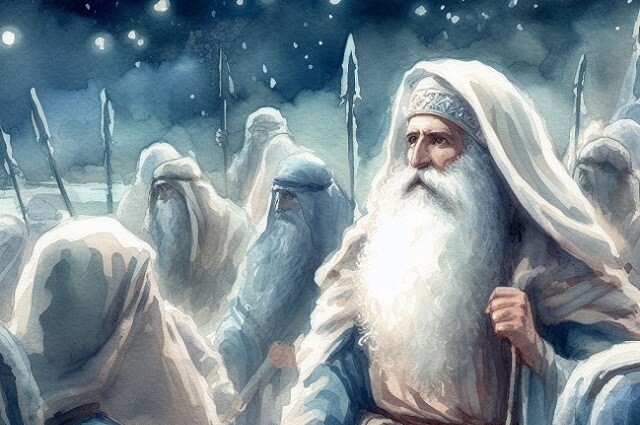
וַיִּשְׁמַע אַבְרָם כִּי נִשְׁבָּה אָחִיו וַיָּרֶק אֶת חֲנִיכָיו יְלִידֵי בֵיתוֹ שְׁמֹנָה עָשָׂר וּשְׁלֹשׁ מֵאוֹת וַיִּרְדֹּף עַד דָּן.
When Abram heard that his brother had been taken captive, he mustered his retainers, born into his household, numbering three hundred and eighteen, and went in pursuit as far as Dan. (Gen. 14:14)
We are familiar with Abraham as a holy tzaddik and a master of kindness, the spiritual giant who taught the belief in one God in a world of paganism and idolatry. But when news reached Abraham that his nephew Lot had been taken captive, he sprang into action. In that moment, Abraham assumed the role of military leader.
Abraham was the epitome of kindness and chesed, welcoming strangers into his home and providing for the poor. But Abraham was no pacifist. When the time came to fight evil and rescue innocent captives, he took up the sword and led the battle. There is no contradiction, Rav Tzvi Yehuda Kook taught, between these two facets of Abraham’s personality.
Abraham emptied out the Beit Midrash, drafting all of his students whom he instructed “so they should keep the way of the Lord and uphold righteousness and justice” (Gen. 18:19). Abraham, educator par excellence, understood that his disciples needed to learn this lesson of mutual responsibility and act upon it.
Operation ‘Rescue Lot’
Why was Lot abducted? The Midrash explains that Lot was specifically targeted because of his relationship to Abraham. The invading kings “expected Abraham would pay a heavy ransom for the release of his nephew” (Sforno).
Abraham could have chosen to negotiate for Lot’s release, but he believed that Lot could be rescued in a military operation, without negotiations and without ransom. And that was the better option.
Abraham split his men into two forces (Gen. 14:15). One force was charged with attacking and defeating the enemy, while the second force was tasked with rescuing Lot and the other captives (Prof. Asa Kasher). With a surprise attack at night, he was able to overcome the four kings without them realizing that it was only a small force attacking them (Seforno).
And who was Lot? Lot had separated from Abraham, preferring to live with the wicked people of Sodom rather than with his righteous uncle. As the Sages commented, Lot “distanced himself from the Ancient One of the world, saying, ‘I care neither for Abram nor for his God.'”
Yet when Abraham heard that Lot had been taken captive, he immediately set out to rescue him. As the text emphasizes, it was “his brother” who had been taken captive. Abraham knew it was his responsibility to do everything in his power to bring Lot back alive.
Through this action, Abraham demonstrated his profound love for his fellow man, even for those who were distant from his beliefs and teachings. This deep-rooted love and sense of responsibility meant a willingness to risk his life in battle — true mesirut-nefesh — to rescue his estranged nephew.
(Adapted from Sichot HaRav Zvi Yehudah Kook on Breishit)